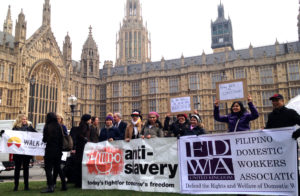Disclaimer: This article is more than 9 years old, and may not include the most up-to-date information or statistics. Please verify information with more recent sources as needed, and if you have any questions contact our Press Office.
26 March 2015
Modern Slavery Act soured by lack of protection for migrant domestic workers and business responsibility loophole say Anti-Slavery International.

Anti-Slavery International welcomed a ‘positive’ Modern Slavery Act but said it left ‘a sour taste in the mouth’ with ‘glaring black holes’ such as excluding the right for overseas domestic workers to change abusive employers, lack of extraterritoriality of slavery offences and a loophole that could allow companies to hide supply chain abuses.
Director of Anti-Slavery International Aidan McQuade said:
“It is a strange feeling to witness a positive moment of a Modern Slavery Bill passed into law yet find it difficult to get too excited and instead I’m left with a bad taste in my mouth given the glaring black holes unaddressed.
“The lost battle to include protections for overseas domestic workers that for them are absolutely crucial is difficult to comprehend. The fact that they have to prove to authorities they have been trafficked before they can change an abusive employer will simply deter many of them from coming forward and escaping the abuse.
“The lack of extraterritoriality of slavery offences means that a British citizen could abuse someone overseas and not be held to account back in UK. Surely we should aim higher than that.
“The loophole in the supply chain clause will allow British companies hide their supply chains overseas as long as the goods they produce don’t end up in Britain. This for example means letting off the hook companies building sites for the FIFA World Cup in Qatar.
“It is all the more frustrating given that the Bill has come a long way from the first draft, in significant part because of the diligent work of some outstanding parliamentarians, but also because the government responded positively to much of the of evidence on the Bill’s deficiencies and improved the Bill accordingly.
“Inclusion of a victim protection section with legal advocates for children and non-prosecution of victims of trafficking forced to commit crimes, and a clause on transparency in supply chains to hold businesses to account, albeit with a bad loophole, are examples of real positives.
“The Modern Slavery Act is a modest step forward in tackling modern slavery in Britain, but it is by no means the end of the road. Unfortunately we have some way to go to have a legislation that is really world leading and fit for purpose.
“Anti-Slavery International will continue to work for the necessary improvements in law, policy and practice that are required to truly challenge the vested interests who continue to benefit from slavery in the contemporary world.“
Note to Editors:
For more information and to arrange interviews please contact Anti-Slavery International Press Officer Jakub Sobik on 07789 936 383 or at j.sobik@antislavery.org; or director of Anti-Slavery International dr Aidan McQuade on a.mcquade@antislavery.org or mobile 07816951088.


